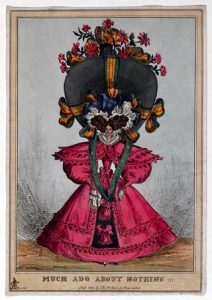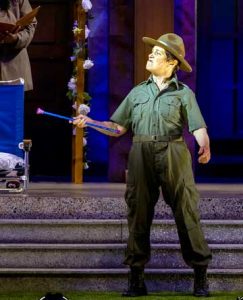Play (1599)
by William Shakespeare
Directed by Megan Sandberg-Zakian
Commonwealth Shakespeare Company
Boston Common
Boston, MA
July 20 – August 7, 2022
With Zoey Abuyuan (Jade), Remo Airaldi (Leonato), Siobhan Juanita Brown (Friar Francis), Siobhan Carroll (Margaret), Nettie Chickering (Sexton), Sarah Corey (Borachio), Duncan Gallagher (Conrade), Jessica Golden (Nicole), Jaime Jose Hernandez (Verges), Tia James (Benedick), John Kuntz (Antonio), Gunnar Manchester (Don John), Jordyn Palmer (Third Watch), Erik Robles (Claudio), Michael Underhill (Don Pedro), Jon Vellante (Balthasar), Xander Viera (First Watchman), Dylan C. Wack (Second Watchman), Rachael Warren (Beatrice), Rebecca-Anne Whittaker (Hero), Debra Wise (Dogberry)

by William Heath
Beatrice (Rachael Warren) and Benedick (Tia James) fight mercilessly, but in the great tradition of romantic comedy that is merely a prelude to their falling in love. In Shakespeare’s hands, that love is moved along by a ploy, but no matter. As well, Hero (Rebecca-Anne Whittaker) and Claudio (Erik Robles) fall in love but their love is then subverted by another ploy by the malevolent Don John (Gunnar Manchester). Nobody knows why he is such a manipulative meanie, but in the end – making this indeed a great comedy – his manipulations come to naught and everything works out.
I have a feeling I may spend the rest of this summer seeing productions of Much Ado About Nothing. The last one was two weeks ago in Maine, and here I am again, on Boston Common, seeing this great as well as moving comedy in the latest Commonwealth Shakespeare outing. This one is directed by Megan Sandberg-Zakian, a capable and highly regarded Boston area theater director, and the results are stimulating and interesting.
Apart from the multicultural casting which in a welcome evolution has now become widespread in contemporary theater, this production innovates by making the primary romantic couple – Benedick and Beatrice – both female. The idea and the mission are welcome and interesting, and the production makes a good effort towards pulling off the vision. That earnest and noble effort to depict a lesbian relationship that sparkles with conflict and then resolves into affection is duly noted, and indeed a wonderful variation to explore. The result, here, at times, however, feels a bit more like earnest and interesting exploration rather than passionate realization. Despite the robust efforts of Rachael Warren and Tia James, the verbal sparks between the two romantic protagonists do not really fly nor does the ensuing passion exhibit much electricity, though the idea of trying for it seems most worthwhile. That lack of fire is not a function of the sexual orientation depicted; but, for whatever reason, neither the fire of conflict nor that of passionate romance quite comes off.

Rachael Warren as Beatrice
in “Much Ado About Nothing”
Photo:Nile Scott Studios
Courtesy of Commonwealth Shakespeare Company
One does notice a certain textual complication that arises from depicting Benedick as a woman. Though the character is in this modification frequently referred to as a woman, there are many instances of banter between Benedick and Beatrice which refer to the opposition of men and women, which in some cases does not seem to matter. In other cases, it does seem to matter, making this textual challenge seem a noble experiment which works to some extent but not throughout.
More sparks do fly elsewhere. As Hero, Rebecca-Anne Whittaker is charged up and fiery when it comes her turn to settle the issues, adding a welcome, strong characterization to the role. That is particularly evident in the final scenes in which she comes forth to Claudio from behind the veil to forcefully state her case. Whittaker does it with gusto and it packs a punch.
Other characters – like Remo Airaldi’s Leonato and Siobhan Juanita Brown’s Friar Francis – are persuasive portrayals with some surprisingly moving moments. Though not large parts, the gravitas of these performances rings through clearly. John Kuntz, a seasoned Shakespearean actor who frequently plays clownish roles, here does foppish justice to the role of Antonio, decked out in one wild outfit after the next.
Oddly and interestingly, many of Shakespeare’s villains – often bad siblings – are simply bad, and we don’t always get an account of why that is the case. With Claudius in Hamlet the source of the badness, besides greed and jealousy, is not spelled out, nor is it clear why Antonio in The Tempest has been so bad to his brother Prospero. With Macbeth, and with Iago in Othelllo, we get a little more background, but not much. Here, as well, Don Pedro’s (Michael Underhill) errant brother Don John is as well just unexplainably bad. As the very malevolent Don John, even though he does not have much time on stage, Gunnar Manchester comes through with a rugged nasty force, a kind of swashbuckling bad pirate energy.

in “Much Ado About Nothing”
Photo:Nile Scott Studios
Courtesy of Commonwealth Shakespeare Company
Wonderfully and somewhat ironically, the real star of this show is the incomparable Debra Wise, long-time impresario at the Central Square Theater and a highly capable actress in her own right. As Dogberry, the constable, she is absolutely hilarious and gripping. She electrifies the stage whenever she appears and every move is filled with comic momentum. She turns the bumbling police force into a powerhouse of humor and punctuates the entire production with an eloquently dramatic and comedic shtick.
There is a lot of great lighting by Eric Southern and Maximo Grano De Oro and some wonderful choreography by Levi Philip Marsman. The set by Lawrence E. Moten III rises high above the stage and is majestically dramatic, serving as well as an able template for Southern’s and De Oro’s compelling lighting. The overall design of the production has something to do with the 1980s – not sure why, but it seems to give the opportunity for some wild costume designs and a bit of music that sounds like disco.
In brief: an innovative idea for the main romantic duo, some moving characterizations, some lively and engaging staging, and some first-class comedic acting – certainly a wonderful opportunity to see some excellent theater, for FREE (though donations are encouraged), in the great Boston Common.
– BADMan (aka Charles Munitz)

Leave a Reply